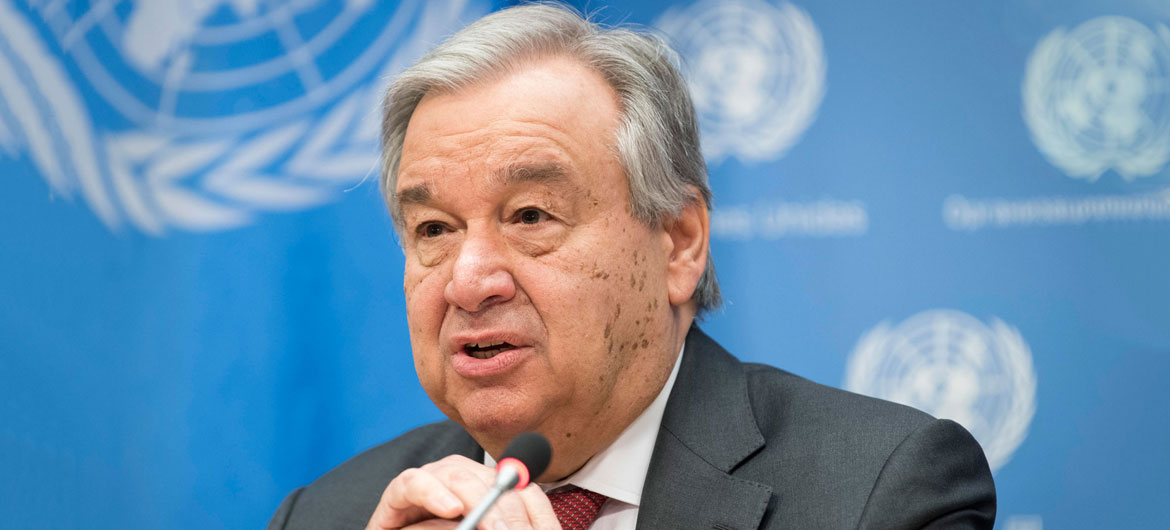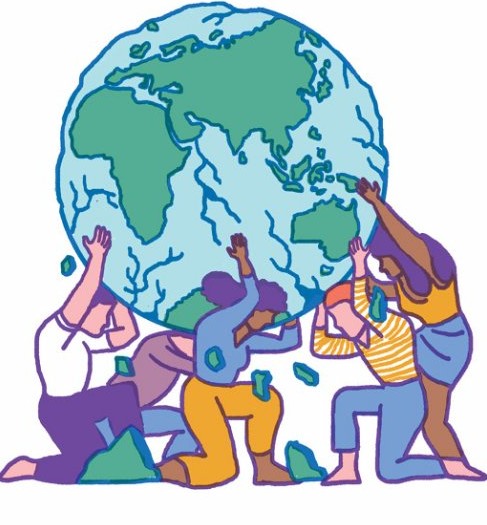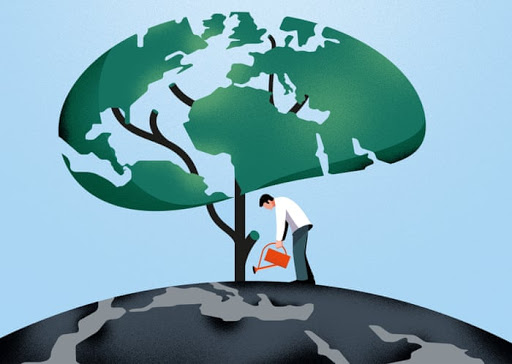Rethinking Our Approach to Economic, Social and Environmental Justice:
The Time is Now for a Visionary Leadership

“We need urgent action now, to recover better from Covid-19, to confront injustice and inequality, and address climate disruption.
We have seen young people on the front lines of climate action, showing us what bold leadership looks like.”-
UN secretary general, António Guterres.- Photo: UN News
UN calls on youth activists to advise on climate crisis and Covid-19 recovery*
Seven young people will take on roles to “provide perspectives, ideas and solutions”
This was the heading of an article in today’s (28 July 2020) Guardian, which made me so happy that indeed, the COVID-19 crisis is at long last opening our minds to tap into our biggest hope for a better world: Our Youth, their vision, hopes, imagination, dreams, idealism and commitment.
‘Youth climate activists are to advise the UN secretary general on the climate emergency as part of a new effort to bring young people into decision-making and planning on the crisis.’ More on this a bit later.
Nota bene
I am delighted that from the very beginning, since the early 2000s, when the GCGI was founded, we have been at the forefront of valuing, nurturing and celebrating the youth of the world, championing who they are and what they do in building a better future for all of us.

Photo:Poem: Have you heard their voices?
‘What is the unfolding story of the next decades?
The rise of today’s youth, leading the world, with hope, inspiration, commitment, imagination and wisdom in the interest of the common good, to change our troubled world for the better’- Kamran Mofid, Founder, the GCGI
World Transformation and the Youth: Youth to Make the World Great Again …
The Youth of the World: Their voices will be heard …
The Youth for the Common Good to Build a Better World …
Nature the Best Teacher: Re-Connecting the World’s Children with Nature
In Praise of Youth on International Youth Day- Monday 12 August 2019 …
In Praise of the Economic Students at the Sorbonne: The Class of 2000 …
The Youth of Wales Message of Hope to the World at the Time of the Coronavirus Crisis ...
And now reverting to the article: UN calls on youth activists to advise on climate crisis and Covid-19 recovery*
Seven young people, aged between 18 and 28, will take on roles to “provide perspectives, ideas and solutions” to the secretary general, António Guterres, aimed at helping to scale up global climate action in the recovery from the coronavirus crisis and ahead of a crunch summit next year on the climate.
Guterres said: “We need urgent action now, to recover better from Covid-19, to confront injustice and inequality, and address climate disruption. We have seen young people on the front lines of climate action, showing us what bold leadership looks like.”
The new advisory group includes: a young woman from Sudan, Nisreen Elsaim, who is already a junior negotiator at intergovernmental climate forums; an economist, Vladislav Kaim from Moldova; Paloma Costa, a lawyer and human rights defender from Brazil; and from India, Archana Soreng, who works on the traditional knowledge and cultural practices of indigenous people.
They will provide quarterly updates to Guterres, beginning next month, with a particular emphasis on how the global economic recovery from Covid-19 can be aligned with the drastic cuts needed to greenhouse gas emissions.
The question of how to incorporate the views of young people into the UN decision-making process at the annual climate negotiations is a difficult one for the UN and the UK, which will host the next round of climate talks, known as Cop26.
At last year’s annual climate talks, which took place in Madrid, young activists, women and indigenous people complained that they were given little chance to be heard. At one point, activists were shut out of the conference centre for most of a day after staging a brief disruption. While teenagers and young people of all nations, groups of schoolchildren and many parents wheeling babies in prams were much in evidence in the wider conference, the negotiating halls were the domain almost exclusively of middle-aged men in suits.
The snail’s pace of the official negotiations – which ended with a partial statement of intent and failure to clear up outstanding technical points – was thrown into stark relief by the sense of urgency and passionate advocacy of civil society, and the 500,000-strong march of people through Madrid, led by Greta Thunberg and other young people.
“We want to ensure the voices of young people are heard not only on the streets, but in the conference chambers,” said Jayathma Wickramanayake, the UN secretary general’s envoy on youth. “The reality is that young people today will live with the repercussions [of climate breakdown]. We want to look at the lessons learned from Madrid. This is their future we are talking about.”
The Cop26 summit was originally set for this autumn, but has been delayed by a year to next November because of the coronavirus crisis. The UK and Scottish governments, as hosts of the Glasgow conference, will face difficult decisions over how to ensure a strong role for civil society in the context of the pandemic.
Before that, the Italian government – which is co-hosting the Cop26 talks with the UK – will hold a separate youth conference that will simulate the real negotiations. “We want to see how young people negotiate a climate deal, and how it would be different from the deal negotiated by governments and politicians,” explained Wickramanayake.
National governments will also be urged to include young people in their delegations to Cop26.
Last year, the UN held the first Youth Climate Summit, with more than 1,000 “climate champions” from more than 140 countries, to create a forum for young people.
*This article by Fiona Harvey was first published in The Guardian on 28 July 2020.
...And finally, lest we forget
This is the Path to Make the World Great Again: A Path Envisioned with Hope and Imagination

Illustration: Nathalie Lees/The Guardian
To reverse the current destructive path we need a different model of education and we need a different economic value and economy. However, these are not possible to achieve so long as The Fraudulent Ideology reins supreme. Full stop. Carpe Diem!
Why Love, Trust, Respect and Gratitude Trumps Economics
Nature the Best Teacher: Re-Connecting the World’s Children with Nature …
On the 250th Birthday of William Wordsworth Let Nature be our Wisest Teacher …
